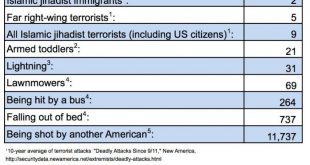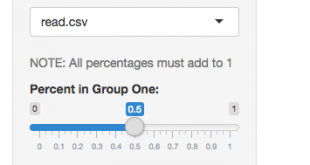Guest post by Jeff Mosenkis of Innovations for Poverty Action. “Economists have now settled down into RCTs as just one tool,” Glennerster told Devex. Among academics, the kind J-PAL works to connect with the world’s policymakers, she said, “the trend toward using RCTs is simply part of this bigger movement in economics to care more about where we can really pin down what is causing what we see.” Any critique I’ve seen of RCTs as a method apply in one way or another to any empirical study...
Read More »Congratulations to Kim Kardashian
From the World Economic Forum: Kim Kardashian is an unlikely champion of statistics, but a tweet from the reality TV star in January 2017 contained a startling figure that has been named International Statistic of the Year. She shared a table showing a range of violent or unexpected ways people meet their deaths annually in the United States. Kardashian’s aim was to highlight how many more Americans are killed by fellow citizens with guns, than by...
Read More »Andrew Gelman — Yes, you can do statistical inference from nonrandom samples. Which is a good thing, considering that nonrandom samples are pretty much all we’ve got.
To put it another way: Sure, it’s fine to say that you “cannot reach external validity” from your sample alone. But in the meantime you still need to make decisions. We don’t throw away the entire polling industry just cos their response rates are below 10%; we work on doing better. Our samples are never perfect but we can make them closer to the population. Remember the Chestertonian principle that extreme skepticism is a form of credulity. Making assumptions is necessary. However, it is...
Read More »IPA’s weekly links
Guest post by Jeff Mosenkis of Innovations for Poverty Action. An interesting new Center for Global Development working paper looks at the effects of family planning services becoming available across Malaysia. They find that it helped girls earn more later in life, even those too young to benefit directly from the program. Girls just born grew up to earn more (and were more likely to have their elderly parents move in with them), presumably through a generalized improvement in women’s...
Read More »IPA’s weekly links
Guest post by Jeff Mosenkis of Innovations for Poverty Action. An interesting new Center for Global Development working paper looks at the effects of family planning services becoming available across Malaysia. They find that it helped girls earn more later in life, even those too young to benefit directly from the program. Girls just born grew up to earn more (and were more likely to have their elderly parents move in with them), presumably through a generalized improvement in...
Read More »IPA’s weekly links
Guest post by Jeff Mosenkis of Innovations for Poverty Action. An interesting new Center for Global Development working paper looks at the effects of family planning services becoming available across Malaysia. They find that it helped girls earn more later in life, even those too young to benefit directly from the program. Girls just born grew up to earn more (and were more likely to have their elderly parents move in with them), presumably through a generalized improvement in women’s...
Read More »IPA’s weekly links
Guest post by Jeff Mosenkis of Innovations for Poverty Action. South Africans, trying to come to grips with the astonishing scale of the crisis, have adopted a once-obscure political science term, “state capture,” as a staple of even casual conversation … Yet previous examples of state capture have almost always involved a broad cast of protagonists: an entire industry, for example, or wealthy businessmen as a group. In South Africa, it may have been pulled off by a single family....
Read More »IPA’s weekly links
Guest post by Jeff Mosenkis of Innovations for Poverty Action. South Africans, trying to come to grips with the astonishing scale of the crisis, have adopted a once-obscure political science term, “state capture,” as a staple of even casual conversation … Yet previous examples of state capture have almost always involved a broad cast of protagonists: an entire industry, for example, or wealthy businessmen as a group. In South Africa, it may have been pulled off by a single...
Read More »IPA’s weekly links
Guest post by Jeff Mosenkis of Innovations for Poverty Action. South Africans, trying to come to grips with the astonishing scale of the crisis, have adopted a once-obscure political science term, “state capture,” as a staple of even casual conversation … Yet previous examples of state capture have almost always involved a broad cast of protagonists: an entire industry, for example, or wealthy businessmen as a group. In South Africa, it may have been pulled off by a single family....
Read More »Noah Smith — Why ‘Statistical Significance’ Is Often Insignificant
The knives are out for the p-value. This statistical quantity is the Holy Grail for empirical researchers across the world -- if your study finds the right p-value, you can get published in a credible journal, and possibly get a good university tenure-track job and research funding. Now a growing chorus of voices wants to de-emphasize or even ban this magic number. But the crusade against p-values is likely to be a distraction from the real problems afflicting scientific inquiry.... The...
Read More » Heterodox
Heterodox





